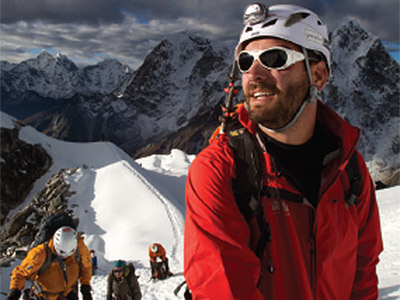
Who: Erik Weihenmayer
What: On May 25, 2001, Erik Weihenmayer became the only blind man in history to reach the summit of the world’s highest peak, Mount Everest. On August 20, 2008, when he stood on top of Carstenz Pyramid, the tallest peak in Austral-Asia, Weihenmayer completed his quest to climb the Seven Summits, the highest mountains on each of the seven continents.
Awards and Recognition: An ESPY award, recognition by Time in 2001, induction into the National Wrestling Hall of Fame, an ARETE Award for the superlative athletic performance of the year, the Helen Keller Lifetime Achievement award, Nike’s Casey Martin Award, and the Freedom Foundation’s Free Spirit Award
Literary Ambition: Author of books Touch the Top of the World and The Adversity Advantage: Turning Everyday Struggles Into Everyday Greatness.
You and Kyle accomplish things that most people, despite being able-bodied, can’t find within us to do. Why is that?
A: The principle behind No Barriers is that people do have it within them. In the late ‘90s, I got a call from Mark Wellman [accomplished paraplegic athlete]. Mark is an amazing guy, and he called me up to be part of a climb. I see that as the inception of No Barriers, because I met these disabled guys [on the climb] who have figured out their systems. No Barriers started as a very grassroots campaign. Real barriers get in the way, some are perceived, but a lot of times they are real. What No Barriers does is it takes people who are marginalized and asks ‘how do you get them back in the thick of things?’ It’s about really thinking about barriers in new ways. We’re trying to build a community of innovators. No Barriers is really about a mindset of developing tools and support systems to attack our challenges head on and have more control over our futures and perhaps live out our dreams.
What else do you think is pertinent to say about No Barriers?
A: Folks like myself and Kyle, who climbed Kilimanjaro in an amazing way, [are exceptional] but all people with disabilities aren’t going to climb Everest or Kilimanjaro. Those are the extreme cases of adventure athletes. They get a lot of media attention, and that’s really tremendous, but again, some people come to No Barriers because they are using prosthetic legs and they just want to walk a set of stairs. That’s their barrier. So we’re not just about building Kyles in the world, we want to help people look at the stage of life they’re in and what barriers are in front of them. Start where you are.






